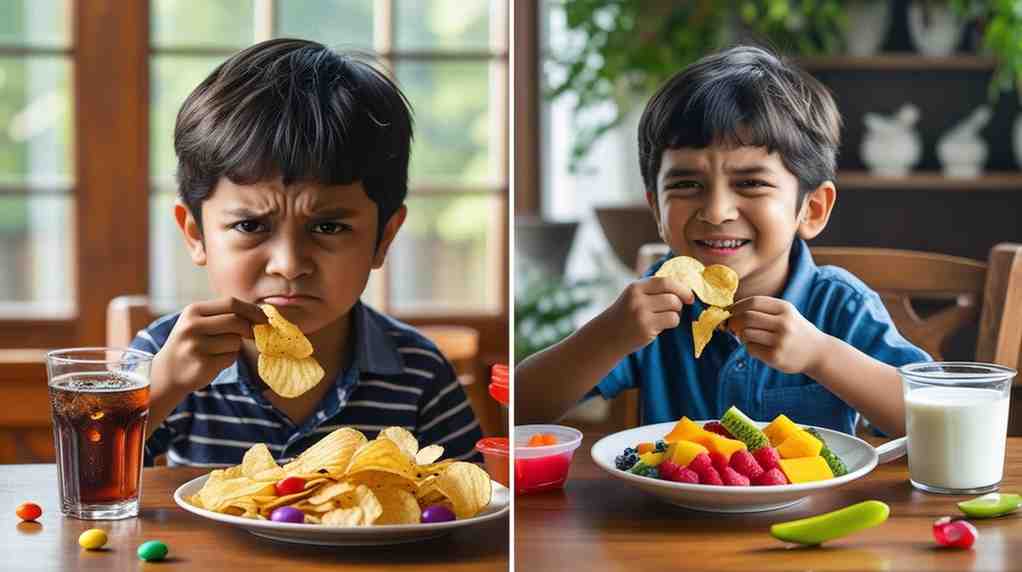You have tried it all: healthier snacks, less time with a device, and more sleep. However, your child does not stop having meltdowns or getting angered easily, or not being able to focus. What happens when the issue is not in the mind of the person, but in the stomach?

🧠 The tummy tells the brain of your Child
Did you also know your child has more than 100 million nerve cells in his stomach? It is also a major manufacturer (90 percent) of serotonin, a natural body chemical that causes us to be happy and relaxed (Furness, 2012).
The gut constantly communicates with the brain. This is referred to as the gut-brain connection. In case the gut of your child is compromised, the mood and behavior may be affected as well (Zou et al., 2021).
😣 Signs the Gut Might Be Out of Balance
An imbalance of “too many bad” bacteria and not enough “good” in the gut is known as gut imbalance or dysbiosis. It may result in:
| Gut Problem | Mood or Behavior Change |
| Not enough good bacteria | Sadness, anger, anxiety |
| Irritation or inflammation of the gut | Brain fog, tiredness, lack of focus |
| Constipation or diarrhea | Trouble sleeping, low energy |
| Too much junk food | Hyperactivity, mood swings |
Certain studies indicate that children with “Attention Deficit Hyperactivity Disorder (ADHD)” or autism are susceptible to dissimilar gut bacteria compared to other children (Bundgaard-Nielsen et al., 2020, NIH)
🥦 Gut Helpful Foods (and the Mood)
1. Fiber Promotes the Good Bacteria
Foods like: Bananas, guavas, apples (with peel), Carrots, lauki, bhindi, sweet potatoes, Oats, bajra, jowar. These nourish the healthy bacteria in the gut of your child (Koh et al., 2016).
2. Probiotics Are Good Bacteria
Probiotics are highly seen in Homemade curd (dahi), Buttermilk (chaas), and Fermented foods (idli, dosa, kanji).
Research indicates that probiotics such as lactobacillus and bifidobacterium can be used to relieve stress and improve mood among children (Frontiers in Psychiatry, 2019).
3. Prebiotics Are Probiotics Food
These are particular types of fiber that feed the good bacteria. Such as raw garlic, onions, boiled green banana, and methi seeds (a little).
4. Eat This To Avoid Gut Damage
Some foods ruin the good bacteria. Such as chips, biscuits, soft drinks, too much sugar, artificial sweeteners (like aspartame), and too many antibiotics (unless needed).
Pay attention after birthday parties or junk food weekends—kids may feel tired or cranky the next day (Scientific American).
👶 Tips by Age
| Age | Gut Focus | What to Give |
| Toddlers | Digestion, Immunity | Dahi, banana, moong dal |
| Kids (6–12) | Calm and focused | Idli with chutney, fruit salad |
| Teens | Stress, memory | Chaas, oats with curd, veggie paratha |
💡 Signs Your Child’s Mood Is Connected to Gut Health
- Without any reason tantrum
- Cranky when hungry
- Wants sugar all the time
- Trouble sleeping or focusing
- Tummy troubles + mood swings
✅ Simple Daily Steps to Improve Gut and Mood
- Give curd or chaas every day
- Add fruits or veggies to two meals
- Rotate fermented foods weekly
- Keep sugar to a minimum
- Encourage outdoor play for sunlight
- Use antibiotics only if needed, then follow with probiotics
❓ Frequently Asked Questions
Q: Can a bad gut cause tantrums?
Yes. It’ll alter the brain chemicals that stimulate the emotions.
Q: Do kids need probiotic pills?
Usually not. Give them curd, chaas, and fermented foods first. Only take supplements when a doctor says that is necessary.
Q: When will a change come?
Many parents notice better sleep and mood in 2–3 weeks (Clinical Nutrition ESPEN, 2021).
Q: Can gut issues affect school work?
Yes. Foggy Brain and lack of concentration can be caused by gut issues.
1 thought on “Gut Health and Your Child’s Mood: How Food Shapes Behavior and Focus”